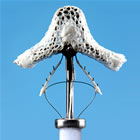
MitraClip, manufactured by Abbott Vascular
Today’s Circulatory System Devices Panel of the Medical Devices Advisory Committee heard testimony from Abbott Vascular, surgeons, cardiologists and patients.
The indications for the MitraClip Clip Delivery System that were being discussed were “the percutaneous reduction of significant symptomatic mitral regurgitation (MR=3+) in patients who have been determined by a cardiac surgeon to be too high risk for open mitral valve surgery and in whom existing co-morbidities would not preclude the expected benefit from correction of the mitral regurgitation.”
In the end, the panel voted on three questions which relate to the approvability of the device, and the envelope goes to…well here are the votes:
(1) Is there reasonable assurance that the Abbott Vascular MitraClip CDS is safe for use in patients who meet the criteria specified in the proposed indication? The vote was 8-0 in favor.
(2) Is there reasonable assurance that the Abbott Vascular MitraClip CDS is effective for use in patients who meet the criteria specified in the proposed indication? Here the vote was a tie, so the head of the panel broke the tie and not in favor of efficacy. The vote was 5-4 against.
(3) Do the benefits of the Abbott Vascular MitraClip CDS for use in patients who meet the criteria specified in the proposed indication outweigh the risks for use in patients who meet the criteria specified in the proposed indication? Here, although the panel voted against efficacy, the safety profile was strong enough so that they felt the risk:benefit ratio was favorable. The vote was 5-3 in favor.
So a recommendation for approval now goes to the FDA itself. It’s important to understand that this panel only provides a recommendation to the FDA. The Agency will most definitely be holding continuing talks with Abbott Vascular, the manufacturer, before making a final determination.
The MitraClip has been approved in Europe (over 40 countries, in fact) for four years now, but patients in the U.S. have only been able to get it under an investigational exemption (part of a randomized trial) or via “compassionate use” criteria. Several of the commenters on Twitter were pointing out the fact that, if the MitraClip does not get approved and the FDA requires yet another trial, it would be five years before U.S. patients could benefit from this device.
For some background on the MitraClip, read my article from back in the day (that would be 2010), “Catheter-Based Mitral Valve Repair Compares with Open Heart Surgery at One Year.”
I was struck by Dr. Ted Feldman’s comment from that article:
Dr. Ted Feldman
“The most striking thing in our experience is the remarkable clinical response.
“I’ve had patients who literally could not walk across the road without getting shortness of breath and who go home after this procedure and, in less than a week, are doing water aerobics.”
And stories from patients, ostensibly brought in by Abbott, seemed to be of some influence in today’s panel hearing. As Michael O’Riordan (@mikeheartwire) of theheart.org tweeted: “See, one panelist says it was very easy to be swayed by great stories. So patient advocates do matter! #mitraclip #fda”
Yes they do!
Reminds me of an FDA hearing back in the day (that would be 2006) about late stent thrombosis with drug-eluting stents. Articles like Bob Bozell’s reference to “patients walking around with tiny time bombs in their hearts” had caused quite a stir, and brought a patient to Angioplasty.Org’s Patient Forum where he found out about the hearing and, after several long phone chats with me, finally testified.
There was no doubt that his testimony had an effect on the panel. The discussion moved just a bit away from talking about statistics, data and PowerPoint slides, and a bit towards the patient!..many of whom were scared by these “dreadlines” and looking for guidance. (See “Patient Stories: Rick Dulin Speaks to the FDA.”)
Also kudos to @mikeheartwire @Cardiology @theheartorg @MedDevicesDaily @MedDeviceMark for live tweeting the FDA panel hearing!!
Late Update: Read Abbott’s statement on today’s panel hearing, “FDA Panel Recommends MitraClip for Approval.”





In my opinion this is a case of cardiac surgeons unwilling to give-up any perceived turf, even though the patients like my mother, who are at too high a risk for surgery are being offered no alternative.
The MiracleClip by Karen Pomer
March 8, 2013
Tomorrow morning an anxious wife will visit our home. Her daughter is hoping we can help assuage her fears and conflicting feelings, about encouraging her husband of over 60 years to have a life-saving procedure. What her husband doesn’t know is that without the procedure, he could die of congestive heart failure due to mitral-valve regurgitation if he caught a cold.
“What will you tell her?” I ask my mother.
“I’ll tell her I was even more scared because I didn’t know anyone who had had a MitraClip procedure,” she says.
In the fall of 2009, my mother Kato Pomer-van Leeuwen, MD, was a 92-year-old practicing physician who was dying. She was much too weak to be a candidate for open-heart surgery and two leading hospitals had told me take her home and call hospice care.
The MitraClip procedure was our only hope. Luckily we found cardiac interventionist Saibal Kar, MD, and his team at Los Angeles’ Cedars-Sinai Medical Center, who has performed more of these procedures than any other doctor in the world. We later learned she was the oldest, highest-risk patient to receive a MitraClip at Cedars.
In the ensuing three and a half years, my mother has had zero complications due to the MitraClip. Before the procedure the severity of her mitral-valve regurgitation on a scale of 1- 4 was a 4, being the most severe. Her last echo-cardiogram indicated it’s now less than one. Although not yet approved by the FDA, Medicare and her AMA supplemental insurance paid for the entire MitraClip procedure.
In the first year or so after her procedure, my mother’s youngest daughter turned 50, her eldest granddaughter turned 18 and entered college, and her grandson was bar-mitzvahed. All these milestones would have been bittersweet for my family without my mother.
My mother is with us enjoying life at 95 and a half. Until she retired last year she was still seeing patients. She is a doting grandmother and wonderful companion to her friends and daughters.
If it were not for Dr. Kar and the MitraClip clinical trials at Cedars-Sinai, none of this would have been possible, and we would be heartbroken without the glue that holds our family together. There is no doubt that the MitraClip procedure is the only reason my mother survived.
In our family the MitraClip is called the MiracleClip, and and that’s what we will share with the worried wife.
Here is my written testimony for the FDA panel:
https://www.facebook.com/notes/karen-pomer/the-miracleclip-by-karen-pomer/445520165523593